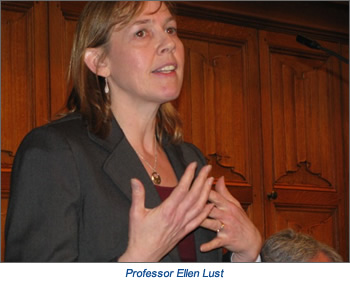
A panel of four Middle East experts discussed the democratic uprisings in the region on February 8 in the law school auditorium. It was post-revolution in Tunisia and mid-revolution in Egypt, before President Hosni Mubarak stepped down.
Adria Lawrence (Yale University) set the stage for later discussion among her fellow panelists when she said that there are two main strands of thought regarding the role of the U.S. in Egypt. “On one side, there are those who suggest that the protest has provided an opportunity for the U.S. to rehabilitate its image in the Arab world by demonstrating a clear commitment to democracy and human rights. On the other side are those who want to prioritize stability over democracy.” She said both views reflect the world view that the United States has a leadership role to play “and I argue that the United States has neither the will nor the competence to follow either of these recommendations well. Instead, what I’d like to see is a more disengaged United States.” She said the U.S. lacks credibility in Egypt. “I believe that above all else, the U.S. needs to stop interfering in the region.”
She said the Obama administration has “vacillated in response to the protests. It has imperfectly sought a middle road, seeking stability and slow democratic reform.” She added that there is no clear path that will serve U.S. interests, and given that reality, “the U.S. ought to keep its nose out of the region.”
Adel Allouche (Yale University), who defined himself as first a historian then a Tunisian, gave a short version of Tunisia after independence in 1959, during which time it had only two leaders, Habib Bourguiba and Zine El Abidine Ben Ali. Along with all the other problems that led to the latter’s overthrow in January, he said corruption pervaded “every aspect of the economy, which was controlled by relatives or cronies of the president.”
Tarek Masoud (Harvard University) said “I had no sense this was going to happen, and I’ve been studying Egypt for a very long time,” he said. “But it’s obvious in hindsight because if you look at Egypt over the last 30 years, there’s been a huge amount of combustible material just waiting to go off: you had high youth unemployment, high inflation, political stagnation and oppression, rigged elections.” He spoke of a lack of political efficacy in past protests, until the protests in Tunisia contributed to a sense of collective efficacy, although he added that it was possible the uprising would have happened without Tunisia.
Masoud proposed that instead of discussing the creation of a new constitution, “which would founder on the question of whether there should be a state religion,” the protesters might be better off focusing on forcing Mubarak to hold free and fair elections in three months. “Then you would be providing them with an institutional position from which they could actually dictate the content of reforms.”
He concluded that a commitment to democracy is not the same thing as commitment to U.S. interests, and, responding to Lawrence’s argument, “If you say the U.S. should remain neutral, it is to say it will keep supporting [the current government of] Egypt.”
Ellen Lust (Yale University) said she would attempt to provide a broader view of changes throughout the region. She pointed out that protests and uprisings don’t necessarily occur in the poorest countries, and that was borne out by the movements in both Tunisia and Egypt, which have a higher standard of living than some other autocrat-led governments in the region. “There will be different kinds of change [in each country] and different rates of change,” she said, “but the region overall will change.”
She said the U.S. has two options: one is to hope for a managed transition. “The problem with that notion is that it has a hard time committing itself to democracy in the region.” The second option, which she called “quite radical, a bit bold and probably unrealistic, but which nevertheless should be discussed, is to find ways in which the United States can take a broader, more regional approach which actually considers ways we can commit to being interested in a democratic region.”
